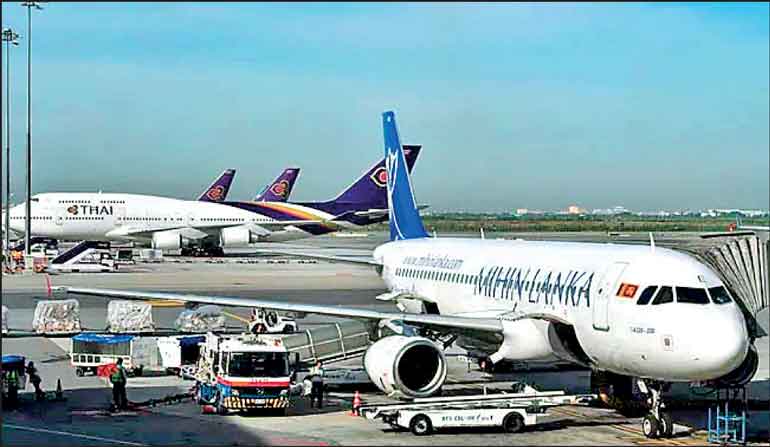Monday Feb 23, 2026
Monday Feb 23, 2026
Friday, 6 May 2022 00:00 - - {{hitsCtrl.values.hits}}

Airlines scaling down services to Sri Lanka is a fresh blow to tourism and air-freighted exports, industry sources warned yesterday.
Among airlines which have reduced frequencies are world’s biggest airline, Emirates, Singapore Airlines, Turkish Airlines, Air Arabia and Saudia. Qatar Airways had stopped selling low fare tickets.
Emirates has reduced from four flights per day to two, but analysts said it is virtually a single flight operation since the other is via Male where traffic is overwhelming. SIA has reduced its services by two.
The reason for the curtailment is waning inbound traffic due to the worsening political instability and social unrest. Airlines also don’t want to increase losses at a time when over $ 100 m in dues is stuck for over six months.
“This is our legitimate earnings for services offered or passengers flown. The failure by the Government to allow repatriation of funds means those who flew our airlines did so free of charge,” said airline sources to the Daily FT.
Such previous earnings (made when exchange rate was Rs. 200 for the US Dollar) are impacted too by the recent sharp devaluation of 40% with official exchange rate currently at $ 370.
The Board of Airlines Representatives (BAR) is seeking meeting with Central Bank and Treasury to resolve the issue of delay in repatriating funds.
“We understand the current foreign currency and reserves crisis. However, we need a proper payment plan instead of operating in an environment of growing uncertainty,” sources added.
Apart from tourism being impacted by higher flight cost to Sri Lanka, the scaling down operations is also impacting air cargo space for high value urgent exports such as apparel and perishable exports.
“Failure to resolve issues impacting the airline industry will have a double whammy for tourism and exports. This could pose further pressure on the country’s efforts to earn much needed foreign exchange,” emphasised the airline industry.
Tourist arrivals fell by 41% to 63,000 in April in comparison to March, recording the lowest inflow for the year so far, shattering industry hopes for a post-pandemic upturn. Industry sources said forward bookings for May onwards were extremely low with many cancellations. Year to date, tourist arrivals amounted to 348,314, a development thanks to the relatively peaceful period of January to March.
